|
 Secure Site
Secure Site
|
 |
Archive for November, 2012
Research published in the last two years shows that certain slow activities–like gentle yoga or gardening–can reduce your stress level and blood pressure and improve your body’s ability to regulate sugar. Past studies have shown that other habits like meditation can help reduce chronic pain and enhance mental clarity. The first step to finding “slowness”is to clear some room in your life–watch less TV or spend less time browsing at the mall. “Jettison the clutter that clogs up your schedule,” says Carl Honoré, author of In Praise of Slowness (HarperOne, 2004). “When you focus on the things that are important at work or at home you can enjoy those things more,”he says. You can also take a more relaxed approach to the things you already do and adopt new habits that require mindfulness. “It’s one thing to say you’re going to slow down, but a slow hobby helps you put those words into practice,” says Honoré. To get you started we’ve come up with seven ways to destress and reenergize.
 gardening is a great mindfulness practice that cultivates stillness of mind 1. Become a Gardener
Caring for flowering plants may help you relax and get grounded. In 2004, researchers at Japan’s Utsunomiya University found repotting plants lowered fatigue and promoted physiological relaxation in study participants, and that working with flowers seemed to have a stronger positive effect than working with nonflowering plants.
HEALTH BENEFITS Research shows that exposure to plants–and even just looking at them–can reduce blood pressure, increase concentration and productivity, and help you recover from illness, says Andy Kaufman, Ph.D., assistant professor of tropical plant and soil sciences at the University of Hawaii in Honolulu. He cites a classic 1984 study, published in Science, which showed that even the view of a green garden helped surgical patients recovering from gall bladder surgery. Among a group of 46 patients in a Pennsylvania hospital, the 23 who had rooms with windows facing greenery had shorter postoperative stays and needed fewer pain–relieving analgesics than the 23 whose windows faced a brick wall.
GETTING STARTED If you live in an apartment or don’t have much room to garden, invest in the EarthBox (earthbox.com), a self–watering container garden that comes with potting soil and fertilizer. “Even if you have a brown thumb, you can grow things [in it],”says David Ellis, American Horticulture Society spokesperson. You could also join a community garden; visit ahs.org, the American Horticulture Society’s website, for more info.
 yoga helps to slow us down 2. Practice Slow Yoga
Slow yoga emphasizes one drawn–out breath for each movement you make. Like tai chi, it uses many repetitive flowing moves. “When you practice slow yoga, you create more awareness between mind and body,”says Beth Shaw, founder of Yoga Fit Training Systems in Los Angeles. This creates a deep sense of stillness and helps develop patience and lower stress, she adds.
HEALTH BENEFITS Last year, researchers in Sweden and India showed that practicing yoga can reverse the negative effects of high blood pressure, obesity, and high blood sugar. The studies, published in the journal Diabetes Research and Clinical Practice, showed reduced waist circumference, blood pressure, blood sugar, and triglycerides (the chemical form of fat cells) and higher HDL (so–called good cholesterol) levels in a control group that practiced yoga versus a placebo group.
GETTING STARTED To find a Slow Yoga class near you visit yogafit.com or inquire at your local yoga studio. You might also consider restorative or yin yoga, two other gentle forms of the practice.
 Take a nap 3. Take a Nap
You snooze, you win, according to a Harvard study published last year in The Archives of Internal Medicine. Researchers revealed that people who regularly napped at least three times a week for an average of 30 minutes had a 37 percent lower risk of heart attack than those who didn’t nap. “It shows that napping is an important preventive strategy just like regular exercise, eating right, and not smoking,”says Sara C. Mednick, Ph.D., author of Take a Nap! Change Your Life (Workman, 2006).
HEALTH BENEFITS A daily nap also boosts serotonin, says Mednick, which may lead to improved memory and performance. Napping can even contribute to weight loss, according to a study in the American Journal of Physiology, Endocrinology, and Metabolism in 2007. That study looked at hormone levels in 41 men and women who were part of a seven–day sleep–deprivation experiment. Those allowed to nap for two hours following a night without any sleep showed a significant drop in cortisol, a hormone related to high levels of stress, and a complement of growth hormone, which helps regulate insulin and fat storage. Researchers concluded that a midafternoon nap improves alertness and performance and reverses the negative metabolic effects of sleep loss.
GETTING STARTED The best time to nap is between 1 p.m. and 3 p.m., but a 15– to 20–minute power nap at any time can help. Set your Zen Alarm Clock for 20 minutes. Close the office door and take a snooze, or find a quiet place where you feel safe. Nap on weekends, Mednick says. “Just don’t use the weekend to catch up on sleep lost in the week.”Check with your doctor about napping if you’re being treated for insomnia.
4. Start a Slow Hobby
 learning to paint Hobbies that require mindful, solitary activity–such as knitting, painting, sculpting, crocheting, or quilting–can act as a brake on your hectic pace.
HEALTH BENEFITS “Slow hobbies help you cultivate the lost art of concentration and being in the moment. They have a meditative quality to them,”says author Carl Honorè. “And that calming effect goes beyond the act itself. Maintaining that inner stillness enables you to negotiate the fast–moving waters of the rest of your day.”
GETTING STARTED Sixty–four percent of people who knit or crochet say they use these crafts to help them reduce stress and relax, according to the Craft Yarn Council of America. Visit craftyarncouncil.com for information. To learn about drawing, visit drawspace.com. Check with a local college or community center for other craft classes.
5. Eat Slowly
Eating too fast creates stress in the body, says nutritionist Marc David, author of The Slow Down Diet (Healing Arts Press, 2005). That causes a spike in cortisol and insulin, which in turn diminishes your ability to burn calories and makes you more likely to gain weight. Eating quickly also leads to overeating. “The brain demands more food if it doesn’t have time to register its needs for taste, aroma, and satisfaction,”says David.
HEALTH BENEFITS Taking time to eat creates a relaxation response, which means you’ll have fewer digestive complaints and your body will be able to take in the nutrients it needs. Plus “we make better food choices, and we know when to stop,”he adds.
GETTING STARTED To ease the pace, double the time you spend on your meals; for example, if you usually eat breakfast in five minutes, stretch it out to ten. “Focus on your food: Taste it, enjoy it, notice it, savor it,”says David. “Find relaxed time between bites by slowing down your internal conversation. Let go of any sense of urgency, and allow the moment to be sensual.”The cooking process can help you slow down too, says David. “Instead of microwaving something, make a soup from scratch.”
6. Do One Thing at a Time
A lot of us believe we get more done by multitasking. But research at the University of Michigan published in the Journal of Experimental Psychology in 2001, shows the opposite is true. “If you concentrate on one task at a time, you get more done faster and make fewer mistakes,” says David E. Meyer, director of the Brain, Cognition, and Action Laboratory at the University of Michigan.
HEALTH BENEFITS Taking on chores one at a time reduces chronic stress and protects your short–term memory, which comes under fire if the brain is overtaxed.
GETTING STARTED To curb outside distractions and focus better, set aside time when you can concentrate on one activity from start to finish. For example, check e–mail once an hour and turn off your instant messaging; let your phone messages go to voice mail and only check them occasionally throughout the day.
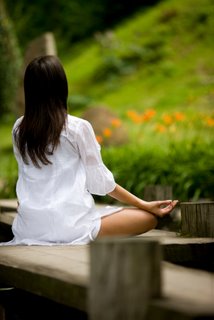 practice meditation in order to slow down 7. Meditate
“Meditation teaches us to focus,”says Steven Hartman, director of professional training at the Kripalu Health and Yoga Center (kripalu.org) in Stockbridge, Mass. “All day your mind is chattering. When you meditate, you can hear your own inner wisdom.”
HEALTH BENEFITS Studies have shown that practicing meditation also improves blood pressure, fortifies the immune system, and promotes a sense of well–being. “A daily meditation practice can bring body, breath, mind, and spirit into balance,”says Hartman.
GETTING STARTED Check out a program like Transcendental Meditation. (See tm.org.) Or begin at home: “Put an egg timer on and stay with your breath for just two and a half minutes,”says Hartman. “Keep your spine tall and straight and allow the breath to be natural.”If you’re seated on the floor, a cushion can raise your pelvis and bring your spine into a natural position. As you get comfortable with the practice, you can increase your time to 15 or 30 minutes a day.
adapted from Natural Health Magazine, by Chrystle Fiedler
One of the ultimate Zen like experiences is waking-up from a great slumber refreshed and energized. Your mind and body are harmoniously one, both alert and focused. Having a refreshed mind and body are two keys to a natural and Zen lifestyle. Waking up in the morning should not be a loud and abrupt awakening, but rather it should be a peaceful positive experience. The right natural alarm clock can transition your deep and tranquil sleep into a serene start to consciousness. Imagine a long-resonating Tibetan bell-like chime waking you up to a beautiful morning experience.
The right alarm clock can be the most beneficial investment for you. With our Now & Zen natural alarm clock you are awakened more gradually and thus more naturally. Now & Zen is focused on creating a naturalistic lifestyle, and our clocks are an example of our philosophy.
 Zen Meditation Timers with Soothing Chime Now & Zen – Soothing Chime Alarm Clock & Timer Store
1638 Pearl Street
Boulder, CO 80302
(800) 779-6383
Posted in Chime Alarm Clocks, intention, Meditation Timers, Meditation Tools, mindfulness practice, Natural Awakening, Now & Zen Alarm Clocks, sleep, Sleep Habits, wake up alarm clock, Well-being, yoga, Yoga Timer, Yoga Timers by Now & Zen, Zen Alarm Clock, Zen Timers
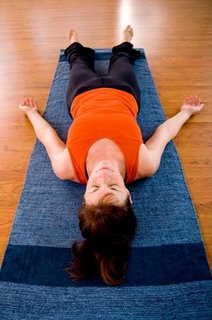 Yoga Pose 1. Lie down in the corpse pose and make yourself comfortable. Try a pillow under the head, and don’t forget a light blanket to keep drafts from drawing your attention outward.
2. Give yourself a few moments to settle, and allow your body to soften into the support of the ground. Watch the breath until it and your heart rate are steady.
3. Bring your awareness to each point listed below and allow the surrounding muscle tissues to relax.
Crown of the head
Forehead, temples
Eyebrows, eyelids, and eyes
Nose
(Focus on the breath flowing in and out of the nostrils, 2–4 times.)
Cheeks, jaw
Mouth, chin
Hollow of the throat
Sides and back of the neck
Shoulders
Upper arms, lower arms
Hands, fingers
Fingertips
(Inhale as if the breath is flowing down to the fingertips and exhale back up through the nostrils, 2–4 times)
Fingers, hands, arms
Shoulders
Chest and rib cage around the back to the spine
Heart center
(Inhale as if the breath is flowing down to the heart center and exhale back up through the nostrils, 2–4 times)
Abdomen
Sides, lower back
Hips, buttocks
Upper legs, lower legs
Feet
Toes
(Inhale as if the breath is flowing down to the toes and exhale back up through the nostrils, 2–4 times)
4. Reverse the sequence, bringing awareness up the body from the toes to the head without pausing for breath awareness at the toes, heart center, fingertips, or nose.
5. Take 10 breaths while keeping awareness spread throughout the body.
6. Make a gentle transition to your next activity.
Use our unique “Zen Clock” which functions as a Yoga & Meditation Timer. It features a long-resonating acoustic chime that brings your meditation or yoga session to a gradual close, preserving the environment of stillness while also acting as an effective time signal. Our Yoga Timer & Clock can be programmed to chime at the end of the meditation or yoga session or periodically throughout the session as a kind of sonic yantra. The beauty and functionality of the Zen Clock/Timer makes it a meditation tool that can actually help you “make time” for meditation in your life. Bring yourself back to balance.
adapted from Yoga International, Jan/Feb 2006 by Bran Cassidy
 Mediation Timers Now & Zen – The Zen Alarm Clock Store
1638 Pearl Street
Boulder, CO 80302
(800) 779-6383
Posted in intention, Meditation Timers, Meditation Tools, mindfulness practice, Zen Timers
 winter hibernation In the depths of winter, do you find yourself wanting to sleep more, eat more and curl up by the fire? We often behave as if seasonal changes are irrelevant to a modern lifestyle. After all, in many ways, civilization is all about overcoming nature. But our bodies are evolutionarily old and remember how weather once dictated behavior. In winter, we hunkered around a fire, repairing tools and telling tales that wove our culture. We packed our bodies close and slept long.
Now we act as if it’s always summer, demanding consistently high productivity at work and at home. But our bodies require cycles of activity and rest—daily, annually. When days are long, our metabolisms and energy levels amp up. In winter, we produce hormones that make us sleepy, giving us time to restore body, mind and soul.
And there’s nothing wrong with that cycle—except that we work against it, forcing ourselves to operate at summer levels even in winter. No wonder so many people feel depressed at this time of year!
How SAD is that?
You’ve probably heard of Seasonal Affective Disorder, or SAD. You might even suffer from it—as many as half a million U.S. citizens do, according to the American Academy of Family Physicians. The fact that most clinicians address the issue via technology (daily exposure to high-intensity electric light) and/or medication provides an interesting perspective on our time. But some have noted that SAD’s symptoms have more in common with hibernation than with clinical depression.
Could SAD be a result of modern living’s demand to move at top speed all day, every day—and mostly indoors, disconnected from the sun’s cycles? Could we give in to a bit of hibernation?
 Time for Winter's Nap
Oh, to hibernate!
Hibernation is a survival strategy some animals use to get through foodless winters. Though humans don’t hibernate, some cultures have come close.
In 1900, the British Medical Association published a description of winters among Russian peasants. For centuries, they survived scant winter food by engaging in lotska—sleeping the whole season away. “At the first fall of snow the whole family gathers round the stove, lies down, ceases to wrestle with the problems of human existence and quietly goes to sleep.”
The peasants woke daily to eat some bread and drink some water and then dropped off again, taking turns keeping the fire going. After six months, “the family wakes up, shakes itself, goes out to see if the grass is growing, and by-and-by sets to work at summer tasks,” the article states.
In a 2007 New York Times editorial, historian Graham Robb similarly described rural 19th-century France:
Economists and bureaucrats who ventured out into the countryside after the Revolution were horrified to find that the work force disappeared between fall and spring…Villages and even small towns were silent, with barely a column of smoke to reveal a human presence. As soon as the weather turned cold, people all over France shut themselves away and practiced the forgotten art of doing nothing at all for months on end.
 slowing down
Dreaming of a better world
What if we indulged our inclination to slow down in winter? We’d sleep more and demand less from ourselves. We’d be more inward and reflective. I once met an artist who had mastered this. Perusing her work, I asked how she stayed creative as a painter, writer, weaver and sculptor. Her answer:
She changes media each season. In summer she’s out on her deck chiseling a sculpture. In fall, she is reflective and poetic. In winter, she works with warm fiber at her loom. And as spring beckons her outdoors, she sets up her easel in the meadow. Should our lives be any less a work of seasonal art?
One of the ultimate Zen like experiences is waking-up from a great slumber refreshed and energized. Your mind and body are harmoniously one, both alert and focused. Having a refreshed mind and body are two keys to a natural and Zen lifestyle. Waking up in the morning should not be a loud and abrupt awakening, but rather it should be a peaceful positive experience. The right natural alarm clock can transition your deep and tranquil sleep into a serene start to consciousness. Imagine a long-resonating Tibetan bell-like chime waking you up to a beautiful morning experience.
The right alarm clock can be the most beneficial investment for you. With our Now & Zen natural alarm clock you are awakened more gradually and thus more naturally. Now & Zen is focused on creating a naturalistic lifestyle, and our clocks are an example of our philosophy.
Adapted from Natural Home Magazine, January/February 2009 by Carol Veniola
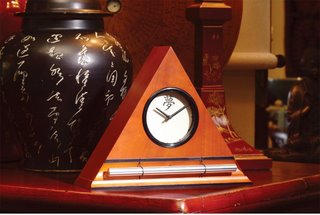 Zen Alarm Clock Now & Zen – Natural Chime Alarm Clock Store
1638 Pearl Street
Boulder, CO 80302
(800) 779-6383
Posted in Japanese Inspired Zen Clocks, Natural Awakening, Now & Zen Alarm Clocks, sleep, Sleep Habits, wake up alarm clock, Well-being
“Mindfulness” is the spiritual practice of being aware of your present moment.
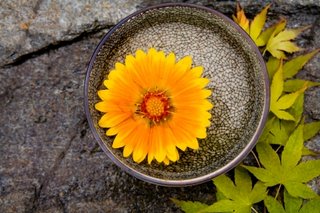 Take a moment to be still
World famous Zen monk Thich Nhat Hanh has developed the use of the bowl/gong in a practice he calls the “mindfulness bell.” When you hear the sound of the mindfulness bell, you are invited to take a moment to breathe in and out and center yourself in the present. During this practice, the resonating sound of the bowl/gong periodically connects you to the peace and tranquility that resides inside you right now. This delightful practice reduces stress and improves your overall health.
 Zen Enso
Zen Timepiece, Zen Alarm Clock and Digital Zen Alarm Clocks can serve as a mindfulness bell in two ways: it can be set to strike on the hour (providing an hourly moment of stillness), or it can be set to strike at a programmed interval, such as every twenty minutes, or even every three hours.
 Mindfulness Further Reading:
- Thich Nhat Hanh Peace is Every Step: The Path of Mindfulness in Everyday Life. Bantam Books 1992
- Tolle, Eckart The Power of Now. New World Library 1998
- Kabat-Zinn, Jon Wherever You Go There You Are: Mindfulness Meditation in Everyday Life. Hyperion Press 1995
- Fontana, David The Meditator’s Handbook: A comprehensive guide to Eastern and Western meditation techniques. Element, Inc. 1992.
- Brooke, Avery Learning and Teaching Christian Meditation. Cowley Publications 1990.
 Hokusai Wave
Hokusai Wave
The Zen Alarm Clock is a consciousness-raising tool. No material object can actually raise your consciousness, but you can use information and devices such as this clock to stimulate your growth. The Zen Alarm Clock can effect your awareness in a variety of positive ways, all of which require your participation.
Use our unique “Zen Clock” which functions as a Yoga & Meditation Timer. It features a long-resonating acoustic chime that brings your meditation or yoga session to a gradual close, preserving the environment of stillness while also acting as an effective time signal. Our Yoga Timer & Clock can be programmed to chime at the end of the meditation or yoga session or periodically throughout the session as a kind of sonic yantra. The beauty and functionality of the Zen Clock/Timer makes it a meditation tool that can actually help you “make time” for meditation in your life. Bring yourself back to balance.
 Gradual Chime Clock Store and Meditation Timer Shop
Now & Zen – Meditation Timer and Gentle Chime Alarm Clock Store
1638 Pearl Street
Boulder, CO 80302
(800) 779-6383
Posted in Japanese Inspired Zen Clocks, Meditation Tools, Now & Zen Alarm Clocks, Zen Timepiece by Now & Zen, Zen Timers
 Early Morning Grogginess Reduced by Gradual Awakening - Ukiyo-e Print by Kitagawa Utamaro Boulder, Colorado—an innovative company has taken one of life’s most unpleasant experiences (being startled awake by your alarm clock early Monday morning), and transformed it into something to actually look forward to. “The Zen Alarm Clock,” uses soothing acoustic chimes that awaken users gently and gradually, making waking up a real pleasure.
Rather than an artificial recorded sound played through a speaker, The Zen Clock features an alloy chime bar similar to a wind chime. When the clock’s alarm is triggered, its chime produces a long-resonating, beautiful acoustic tone reminiscent of a temple gong. Then, as the ring tone gradually fades away, the clock remains silent until it automatically strikes again three minutes later. The frequency of the chime strikes gradually increase over ten-minutes, eventually striking every five seconds, so they are guaranteed to wake up even the heaviest sleeper. This gentle, ten-minute “progressive awakening” leaves users feeling less groggy, and even helps with dream recall.
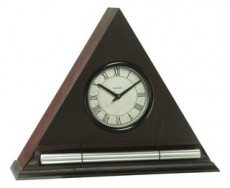 Dark Oak Zen Alarm Clock with Chime What makes this gentle awakening experience so exquisite is the sound of the natural acoustic chime, which has been tuned to produce the same tones as the tuning forks used by musical therapists. According to the product’s inventor, Steve McIntosh, “once you experience this way of being gradually awakened with beautiful acoustic tones, no other alarm clock will ever do.”
Zen Alarm Clocks, made by Now & Zen, Inc., come in a variety of shapes and sizes. Now & Zen’s complete line of natural lifestyle products can be seen at: (www.now-zen.com), or by calling the company at (800) 779-6383 to request a catalog.
 The Gradual Chime Alarm Clock Store Now & Zen – The Gradual Chime Alarm Clock Store
1638 Pearl Street
Boulder, CO 80302
(800) 779-6383
Posted in Chime Alarm Clocks, Natural Awakening, Now & Zen Alarm Clocks, Progressive Awakening, Sleep Habits, Zen Clocks and Dream Recall
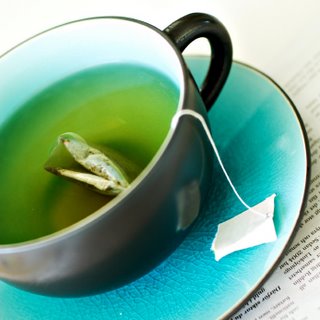 Green Tea for Heart Disease Start sipping your way to a stronger ticker. While heart disease is the biggest killer of women in the United States — nearly twice as many women die from heart disease and stroke than from all forms of cancer combined — a recent “Journal of the American Medical Association” report on green tea offers hope.
In 1994, researchers began studying a group of 40,530 Japanese adults (ages 40 to 79) with no history of stroke or heart disease. Following up with participants 11 years later, they discovered that women who drank five or more cups of the green elixir daily had a 31 percent lower risk of death from cardiovascular disease compared to those who drank less than one cup. (Tea-drinking men showed a 22 percent lower risk.) Can you still safeguard your heart without draining an entire kettle each day? According to lead study author Shinichi Kuriyama, M.D., Ph.D., drinking at least one cup daily would produce health benefits.
adapted from Body + Soul, 2007
“The Zen Alarm Clock & Chime Timer‘, uses soothing acoustic chimes that signal it’s time – gently and gradually.
Rather than an artificial recorded sound played through a speaker, the Zen Clock features an alloy chime bar similar to a wind chime. When the clock’s alarm is triggered, its chime produces a long-resonating, beautiful acoustic tone reminiscent of a temple gong.
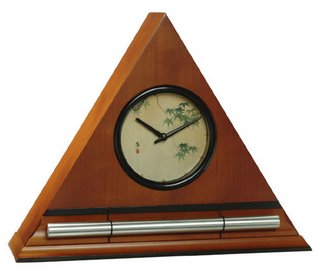 wake up alarm clocks with chimes Now & Zen – The Zen Timer Store
1638 Pearl Street
Boulder, CO 80302
(800) 779-6383
Posted in Now & Zen Alarm Clocks, zen, Zen Timers
 progressive chime clock can help reduce stress and help avoid lack of sleep Although the occasional all-nighter is OK, people who regularly skimp on z’s can’t undo sleep deprivation’s detrimental effects by simply sleeping later on on weekends, says a new study in the journal Science of Translation Medicine. Contrary to popular belief, the energy you feel after a Saturday morning sleep session is only short lived, according to the study. Chronic sleep loss has a cumulative effect on performance. Why? Lack of sleep raises levels of the stress hormone cortisol and affects a person’s ability to respond to stimuli, says Catherine Darley, ND, founder of Seattle’s Institute of Naturopathic Sleep Medicine. Sleep also plays a key role in mood regulation and overall physical and mental functioning. If you need some extra help falling asleep, try a natural insomnia supplement made with melatonin, tryptophan, or valerian. Inquire at your local health food store.
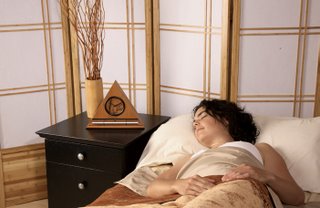 Progression Alarm Clocks for a Gradual Awakening When you have found the perfect routine for falling asleep remember to wake yourself gently so that you can start the day with grace. Set your Zen Alarm Clock 10 minutes earlier than you need to get up so that you can slowly awken in the morning. The Zen Alarm Clock’s long-resonating Tibetan bell-like chime makes waking up a beautiful experience — its progressive chimes begin your day with grace. When the Clock’s alarm is triggered, the acoustic chime bar is struck just once … 3-1/2 minutes later it strikes again … chime strikes become more frequent over 10 minutes … eventually striking every 5 seconds until shut off (see the chime progression graph, below). As they become more frequent, the gentle chimes will always wake you up — your body really doesn’t need to be awakened harshly, with a Zen Clock you’re awakened more gradually and thus more naturally.
adapted from Natural Solutions Magazine, May 2004 by Leslie Crawford
 Chime Alarm Clock - Progressive Wake-Up Clock with Natural Acoustic Chime Now & Zen – Progressive Alarm Clock Shop
1638 Pearl Street
Boulder, CO 80302
(800) 779-6383
Posted in Bamboo Chime Clocks, Chime Alarm Clocks, Japanese Inspired Zen Clocks, sleep, Sleep Habits
 Natural Remeadies for the Winter Season Natural Remedies for the Winter Season.
A cup of tea made with ginger (Zingiber officinale) can help ease congestion and warm the body, which helps your system fight infection. Its anti-inflammatory properties make it a good sore-throat remedy, too.
How to use: Set your Zen Alarm Clock & Timer for 20 minutes. Simmer fresh or dried ginger for 20 minutes; strain and add a touch of honey and a squeeze of lemon, if desired. Incorporate ginger liberally into stir-fries and soups too!
adapted from Body + Soul Magazine, 2009
“The Zen Alarm Clock & Chime Timer‘, uses soothing acoustic chimes that signal it’s time – gently and gradually.
Rather than an artificial recorded sound played through a speaker, the Zen Clock features an alloy chime bar similar to a wind chime. When the clock’s alarm is triggered, its chime produces a long-resonating, beautiful acoustic tone reminiscent of a temple gong.
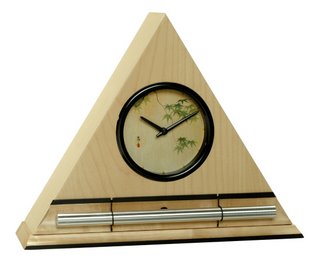 Zen Alarm Clock in Maple Finish with Maple Leaves Dial Face and Chime
Now & Zen – The Zen Timer Store
1638 Pearl Street
Boulder, CO 80302
(800) 779-6383
Posted in Well-being, Zen Timers
 namaste lady This is the season for turning inward—darkness surpasses light, animals begin to hibernate, and the natural world quiets down in preparation for the months ahead. Your practice can benefit when you align with the changing seasons. Take a break from striving on your mat by trying a forward-bending practice. “Forward bends are, by their nature, introspective and meditative,” says Boston teacher Barbara Benagh, who designed the sequence that begins on page 66. “Forward bends are calming to the nerves, soothing, and grounding. These poses teach us that yoga is as much about surrender as effort, if not more so.”
Benagh’s practice begins with reclining hip openers to relax your back muscles and warm your hip joints. From there, her sequence moves into seated forward bends that emphasize a passive stretch of the back muscles while providing a gentle abdominal massage. Set your Zen Timer for 5 inutes. Hold each pose for up to five minutes to give your muscles time to relax and your breath a chance to deepen. Also, be sure to practice asymmetrical poses such as Ardha Ananda Balasana (Half Happy Baby Pose) and Janu Sirsasana (Head-of-the-Knee Pose) on both sides before moving on.
A willingness to surrender is your greatest ally in forward bends, helping to quiet the mind and to release the stiffness that is an obstacle to enjoying the poses. In the spirit of introspection, be more curious about the process than the destination.
adapted from Yoga Journal, by Elizabeth Winter with Barbara Benagh
Use our unique “Zen Clock” which functions as a Yoga & Meditation Timer. It features a long-resonating acoustic chime that brings your meditation or yoga session to a gradual close, preserving the environment of stillness while also acting as an effective time signal. Our Yoga Timer & Clock can be programmed to chime at the end of the meditation or yoga session or periodically throughout the session as a kind of sonic yantra. The beauty and functionality of the Zen Clock/Timer makes it a meditation tool that can actually help you “make time” for meditation in your life. Bring yourself back to balance.
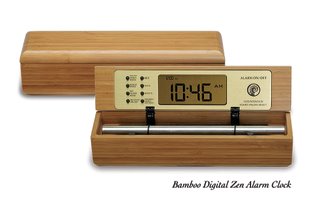 gentle wake up clock with chime, meditation timers Now & Zen – The Yoga Timer Shop
1638 Pearl Street
Boulder, CO 80302
(800) 779-6383
Posted in yoga, Yoga Timer, Yoga Timers by Now & Zen
 Meditation Calms the Mind What It Does
Quiets your mind and hones your focus so you are fully present in this workout. Because the solar plexus is associated with the third chakra, you focus on the color yellow, which is linked to this energy center of the body and believed to inspire confidence, will, and personal power.
How to Do It
Lie back in Corpse pose, palms facing up. Picture a yellow flower, its petals fully open, at your solar plexus. With eyes closed, imagine it floating up with each inhalation and down with each exhalation, riding a slow, gentle wave. Set your Meditation Timer for 5 minutes. Focus on your breath and the flower for two to five minutes.
adapted from Body + Soul
Use our unique “Zen Clock” which functions as a Yoga & Meditation Timer. It features a long-resonating acoustic chime that brings your meditation or yoga session to a gradual close, preserving the environment of stillness while also acting as an effective time signal. Our Yoga Timer & Clock can be programmed to chime at the end of the meditation or yoga session or periodically throughout the session as a kind of sonic yantra. The beauty and functionality of the Zen Clock/Timer makes it a meditation tool that can actually help you “make time” for meditation in your life. Bring yourself back to balance.
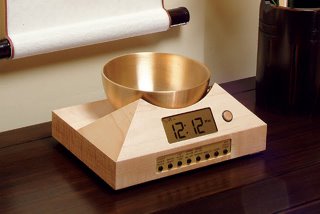 Tibetan Bowel Meditation Timers
Now & Zen – The Zen Meditation Timer and Alarm Clock Store
1638 Pearl Street
Boulder, CO 80302
(800 779-6383
Posted in intention, Meditation Timers, Meditation Tools, mindfulness practice, Well-being, yoga, Yoga Timer, Yoga Timers by Now & Zen, Zen Timers
« Previous Page — « Previous Entries
Next Entries » — Next Page »
|
|
|
|